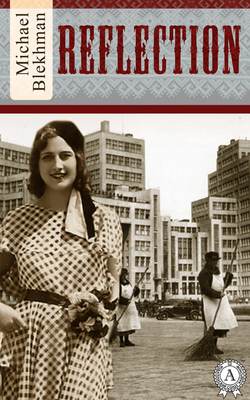Читать книгу REFLECTION - Michael Blekhman - Страница 3
На сайте Литреса книга снята с продажи.
III
ОглавлениеBefore the war, Klara, Maria Isaakovna and Vladimir Fedorovich lived in a privileged two-bedroom apartment that, of course, they didn't have to share with any neighbors. It was located in what was maybe the coziest neighborhood of Kharkov, called Nagorny neighborhood. Maria Isaakovna worked as a construction engineer. She supervised extremely important construction projects and designed huge power plants at Lakes Sevan and Balkhash, and in many other parts of the Soviet Union.
Maria had been born in Byelorussia in a Dnieper shtetl called Rechitsa.
Her real name was Mary and not Maria, but Mary sounded too British, which made little sense when one was from Rechitsa. Isaak, her father, was the best cabinet-maker in the entire province, while her mother, Klara, was considered illiterate and had given birth to eight children. It was true that she didn't know her letters but that hardly made her illiterate. It was just that she had no time to learn, what with eight children and a husband permanently stuck in his cabinet-making workshop.
Still, she was smarter than many of those who knew how to read and write. People from all over the shtetl came to her for advice, just like they did to Sancho Panza on his island. The advice she dispensed was very good. Not once in her life was she known to offer a bad piece of advice.
Among her eight children, there were two girls – Mary and Haya, the rest were boys who – once they grew up – became socialists and died. That is, some of them died because they were socialists, while the others died in the war, which had nothing to do with them being socialists.
One of Mary's brothers turned out to be a mathematician. He proved a theorem that couldn't be proven. Or, rather, aided by his very Jewish spirit of contradiction so disliked by many, he disproved an axiom. Of course, it wasn’t really an axiom since if it were one nobody could have disproven it. Aaron disagreed it was an axiom and this allowed him to prove it wrong. The Imperial Academy of Sciences in St. Petersburg appreciated his outstanding capabilities and awarded him a silver medal on the condition that he would change his unscientific Jewish name of Aaron into a more Russian-sounding Arkadi. His last name, Krupetsky, sounded almost like the aristocratic Russian family names of Obolensky or even Golitsynsky. If only, of course, one could forget about needless particularities.
Her older siblings were always busy, so Mary learned to entertain herself. When she was little, she went to the Dnieper which was so wide it touched the horizon. Only an inexperienced and excessively romantic observer could perceive this river as tranquil in a calm weather (to use Gogol's famed line). In reality, even next to the river-banks there were scores of pits and breakers. One can only imagine how many there were in the middle of the river, which Mary’s four-year-old height barely permitted her to see.
Nobody had taught Mary to fear the river. Nobody had taught her anything except reading and writing but these skills turned out to be useless in dealing with the river. So she entered the water just like she entered her father’s workshop to stare at a new cabinet and holiday chairs or her mother’s kitchen to try knodel, latkes, or gefilte fish. She had no idea she could drown because she didn’t know what drowning was. This is why Mary just started swimming and discovered she liked it. Eventually, she learned to cross the Dnieper and walk on the opposite bank which turned out to be just as ordinary, that is, just as amazing, as her bank where she was born. Then, she would come home by dinner-time.
Klara, as they would later discover, followed in her mother’s footsteps. Once, when they were visiting Rechitsa, she also decided to visit the Dnieper, see what it was like, and take a swim. She was six years old but she still had no idea that in order to swim one had to know how to do it. So she simply ran away and went to the Dnieper, especially since it was so close to her grandparents’ house. Nobody noticed her leaving. A child wandering off on her own was no big deal in Rechitsa. Pogroms had been long gone, the war long over, and there wasn’t as much as a cloud in sight. Klara ran to the river, enjoying life and singing “Stand up, damned of the Earth”, and threw herself into that water that seemed as harmless as fresh soup in her Nana’s old bowl. The river was lots of fun until suddenly its bottom fell through and Klara went under.
She managed to come up for air a couple of times but every gasp of air required more effort than the one before. In the end, she had no more energy to come up and decided to stop trying since it was useless anyways. And then I realized how upset Mom would be when she finds out I drowned, so I decided to emerge from the water one more time, just for her sake.
This was when she was noticed by a young sailor who lived nearby and had just come to the river-bank to take a swim. Without even taking his clothes off, he jumped in the river, dragged the brave girl out, and took her to Maria. Mom still got upset but I can only imagine how heart-broken she would have been, had I actually drowned. This just goes to show that one should always try to come up for air one last time. Who knows, maybe help is on the way at that very moment.
